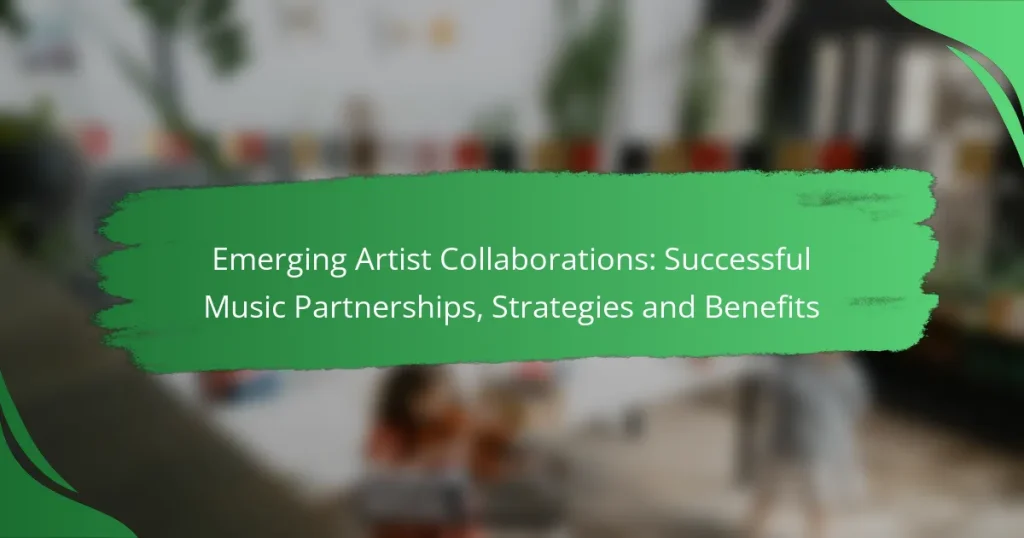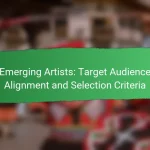Emerging artists can significantly enhance their visibility and career trajectory through strategic collaborations in the music industry. By leveraging social media, live performances, and joint projects, they can connect with each other and their audiences, leading to broader exposure and diverse creative input. Successful partnerships not only blend unique styles but also tap into shared resources, ultimately fostering innovation and expanding reach.
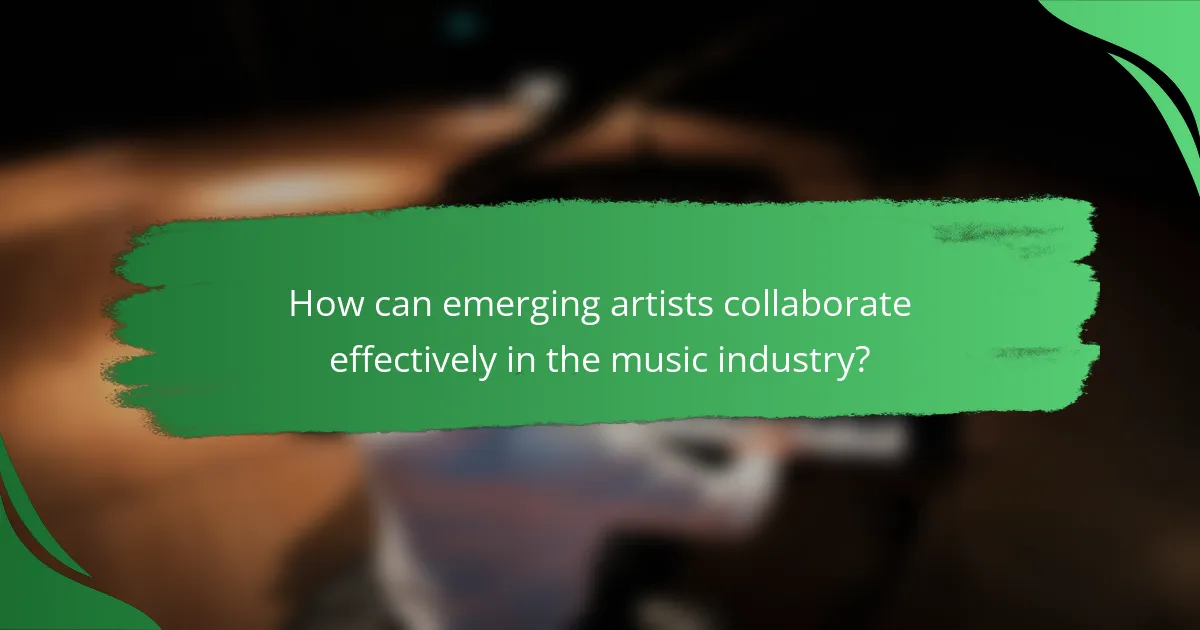
How can emerging artists collaborate effectively in the music industry?
Emerging artists can collaborate effectively in the music industry by leveraging various platforms and opportunities to connect with each other and their audiences. Building relationships through social media, live performances, and joint projects can enhance visibility and create a supportive network.
Utilizing social media platforms
Social media platforms are essential for emerging artists to connect and collaborate. Artists should actively engage with their peers and audiences on platforms like Instagram, TikTok, and Twitter to share their work and discover potential partners.
Creating engaging content, such as behind-the-scenes videos or collaborative challenges, can attract attention and foster relationships. Regularly interacting with followers and other artists can lead to fruitful collaborations.
Engaging in live performances
Live performances provide a unique opportunity for emerging artists to collaborate and showcase their talents. Participating in open mic nights or local gigs allows artists to meet others in the industry and explore potential partnerships.
Collaborating on stage, such as performing a song together or sharing a set, can create memorable experiences for both artists and their audiences. It’s crucial to communicate clearly about expectations and roles during these performances.
Participating in music festivals
Music festivals are excellent venues for emerging artists to network and collaborate. These events often feature a diverse lineup, providing opportunities to meet artists from various genres and backgrounds.
Artists should take advantage of festival workshops and panels to learn from industry professionals and connect with other musicians. Building relationships during these events can lead to future collaborations and increased exposure.
Creating joint music projects
Joint music projects, such as singles or EPs, can significantly benefit emerging artists. Collaborating on a track allows artists to blend their styles and reach each other’s fan bases, increasing overall visibility.
When planning a joint project, it’s essential to establish clear roles and responsibilities, including songwriting, production, and marketing. Setting deadlines and maintaining open communication throughout the process can help ensure a successful collaboration.
Leveraging streaming services
Streaming services like Spotify and Apple Music offer emerging artists a platform to collaborate and share their music with a broader audience. Artists can create collaborative playlists or feature each other’s tracks to introduce their music to new listeners.
Utilizing these platforms effectively requires understanding their algorithms and promotional tools. Artists should consider cross-promoting on social media and engaging with their audiences to maximize the impact of their collaborations on streaming services.
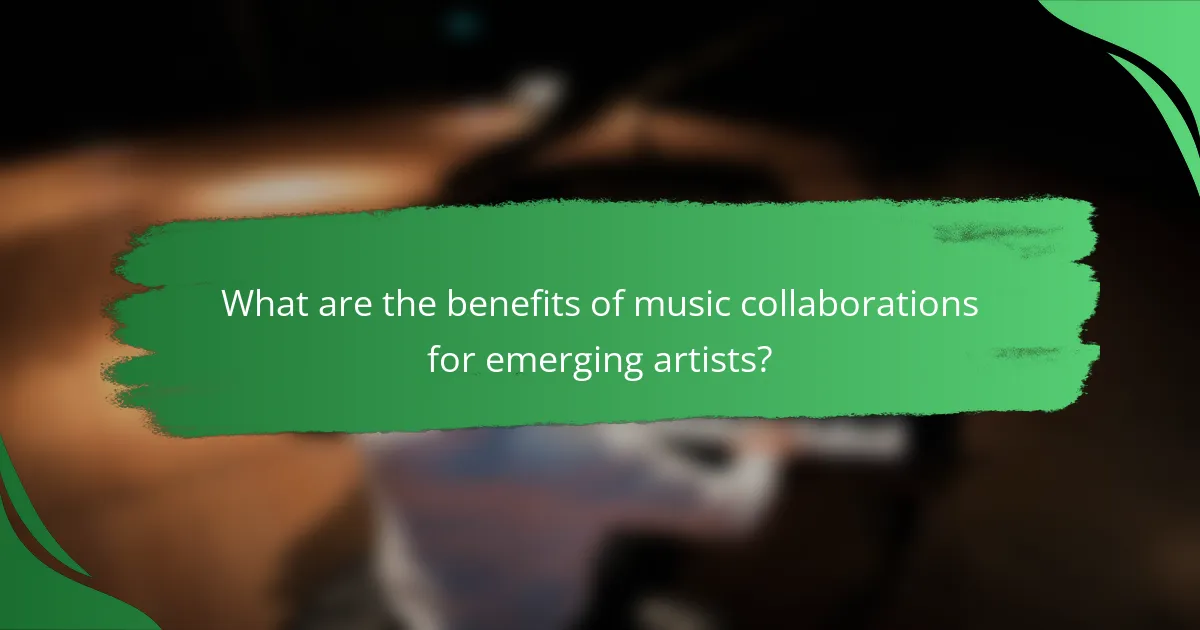
What are the benefits of music collaborations for emerging artists?
Music collaborations offer emerging artists numerous advantages, including broader audience exposure, diverse creative input, and enhanced marketing potential. By partnering with other musicians, they can leverage shared resources and networks to accelerate their careers.
Increased audience reach
Collaborating with other artists allows emerging musicians to tap into each other’s fan bases, significantly expanding their audience reach. This cross-promotion can introduce their music to listeners who may not have discovered them otherwise.
For instance, if an indie artist collaborates with a more established musician, they can gain access to thousands of new fans, potentially increasing their streaming numbers and social media following. This strategy is particularly effective in genres where collaborations are common, such as hip-hop and pop.
Enhanced creative diversity
Collaborations foster creative diversity by bringing together different musical styles and perspectives. Emerging artists can experiment with new sounds and techniques, which can lead to innovative music that stands out in a crowded market.
Working with artists from various backgrounds can inspire fresh ideas and unique compositions. For example, a folk artist collaborating with an electronic producer might create a distinctive sound that appeals to fans of both genres.
Access to industry networks
Collaborating with other musicians often opens doors to valuable industry connections. Emerging artists can gain access to producers, managers, and other professionals who can help advance their careers.
These partnerships can lead to opportunities for live performances, festival slots, and even record deals. Building a strong network through collaborations can be crucial for artists looking to establish themselves in the competitive music industry.
Improved marketing opportunities
Music collaborations can enhance marketing efforts by creating buzz around new releases. Joint projects often generate more media attention and promotional opportunities than solo efforts.
Artists can leverage each other’s marketing strategies, combining social media campaigns, music videos, and promotional events to maximize visibility. For example, a dual release can lead to coordinated marketing efforts that amplify their reach and impact.
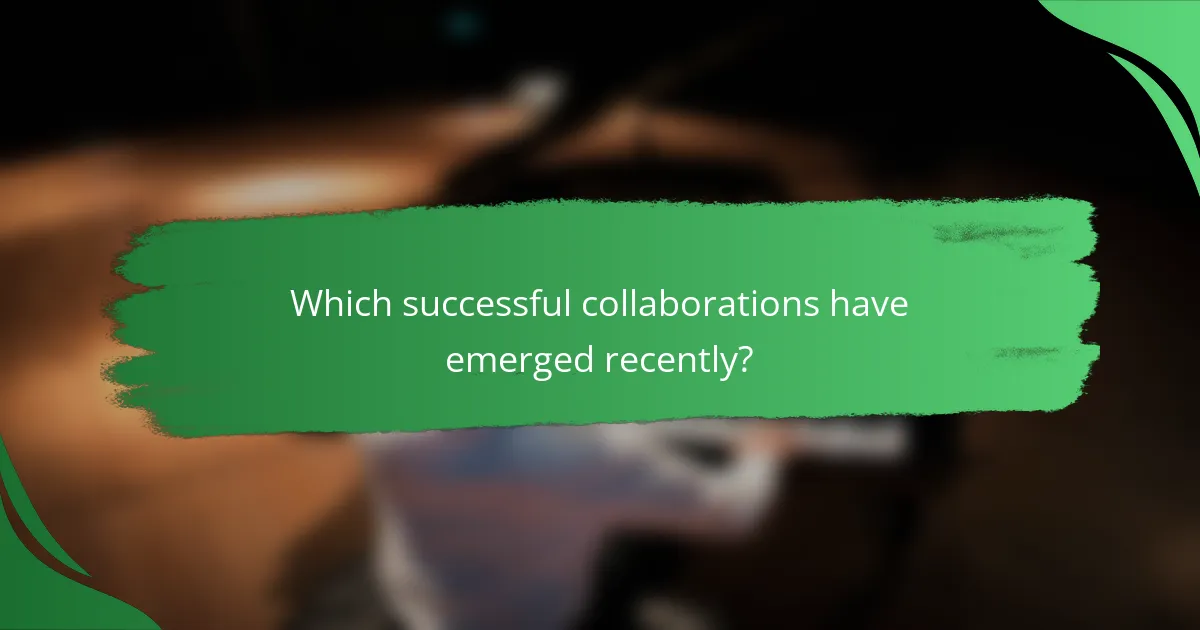
Which successful collaborations have emerged recently?
Recent collaborations in the music industry have showcased the power of partnerships between emerging artists and established names. These collaborations often blend unique styles, expand audiences, and create innovative sounds that resonate with listeners.
Billie Eilish and Finneas
Billie Eilish and her brother Finneas O’Connell have become a defining duo in contemporary music. Their collaboration has led to multiple Grammy Awards and chart-topping hits, characterized by Eilish’s haunting vocals and Finneas’s minimalist production style.
Their partnership exemplifies the synergy that can arise from familial ties, allowing for a deep understanding of each other’s artistic vision. They often co-write songs, ensuring that both their influences are woven into the music, which has resulted in a distinctive sound that appeals to a wide audience.
Olivia Rodrigo and Taylor Swift
Olivia Rodrigo’s collaboration with Taylor Swift has highlighted the importance of mentorship in the music industry. Swift, an established artist, has provided guidance and support to Rodrigo, who has quickly risen to fame with her emotionally charged songwriting.
This partnership has not only helped Rodrigo gain credibility but has also allowed her to tap into Swift’s extensive fan base. Their collaboration on the song “1 step forward, 3 steps back” showcases how blending different generations of artistry can create powerful music that resonates with diverse listeners.
Doja Cat and SZA
The collaboration between Doja Cat and SZA on the track “Kiss Me More” has been a significant success, merging their unique styles into a catchy pop anthem. This partnership illustrates how two distinct voices can complement each other, creating a fresh sound that appeals to a broad audience.
Both artists bring their own flair to the collaboration, with Doja Cat’s playful lyricism and SZA’s smooth vocals. Their ability to blend genres and experiment with different musical elements has resulted in a track that not only topped charts but also showcased the benefits of collaboration in the evolving music landscape.
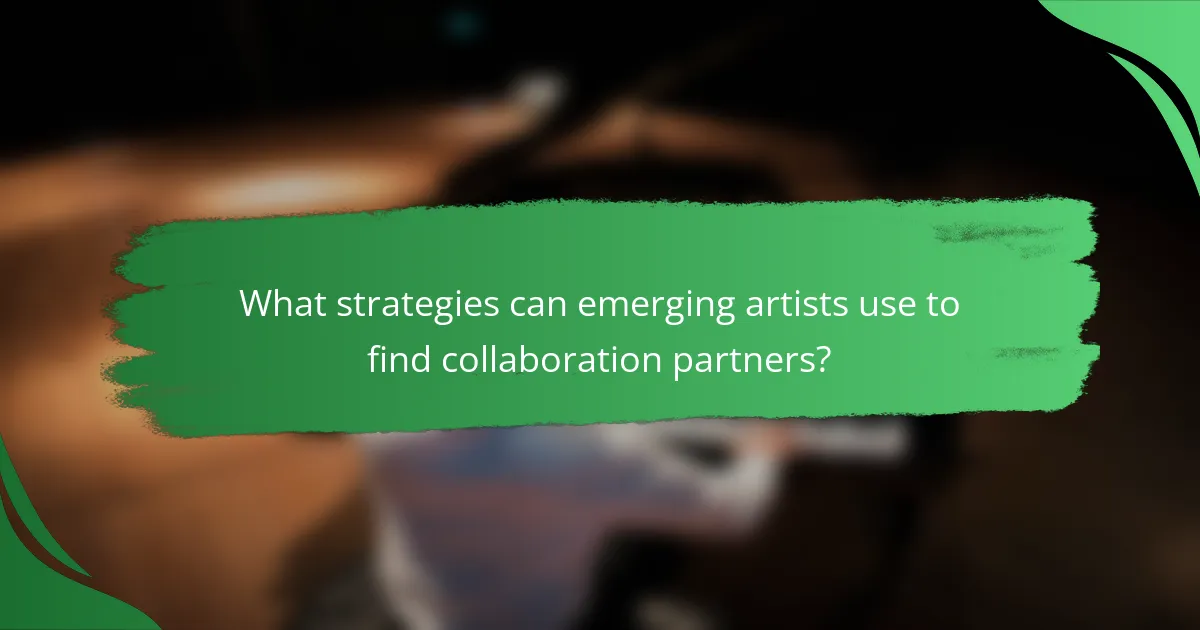
What strategies can emerging artists use to find collaboration partners?
Emerging artists can effectively find collaboration partners by leveraging networking opportunities, utilizing digital platforms, and engaging with online communities. These strategies enhance visibility and foster connections that can lead to fruitful partnerships.
Networking at industry events
Attending industry events such as music festivals, conferences, and showcases is a vital strategy for emerging artists to meet potential collaborators. These gatherings provide opportunities to connect face-to-face with other musicians, producers, and industry professionals.
When networking, be prepared with a concise introduction and samples of your work. Follow up with new contacts after the event to solidify relationships. Remember to engage in conversations and show genuine interest in others’ projects.
Using collaboration platforms like Splice
Collaboration platforms like Splice allow artists to connect and share music projects easily. These platforms often feature tools for co-creation, enabling artists to work together remotely on tracks, samples, and loops.
To maximize your chances of finding a partner, create a compelling profile showcasing your style and previous work. Participate in community challenges or projects to gain visibility and attract like-minded collaborators.
Joining online music communities
Online music communities on social media and dedicated forums are excellent places for emerging artists to find collaboration partners. Platforms like Facebook, Reddit, and Discord host groups where musicians share ideas, seek feedback, and propose collaborations.
Engage actively in discussions, share your music, and offer constructive feedback to others. This not only builds your reputation but also increases your chances of being approached for collaboration. Be mindful to respect community guidelines and foster a supportive environment.
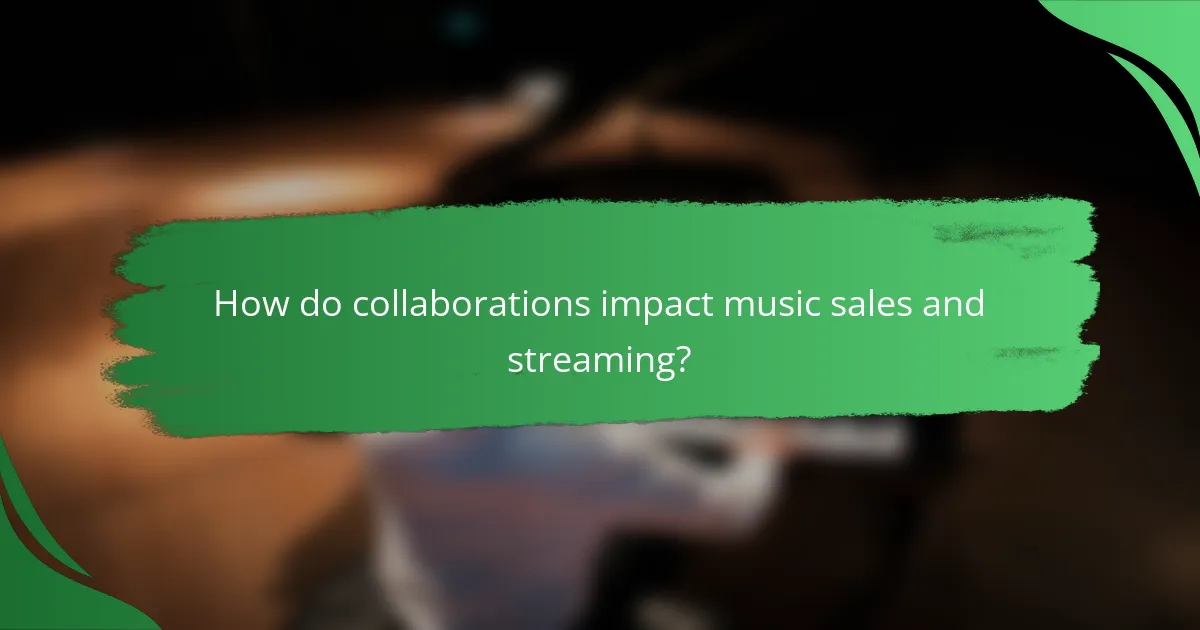
How do collaborations impact music sales and streaming?
Collaborations can significantly boost music sales and streaming by combining fan bases and enhancing visibility. When artists team up, they often attract listeners from each other’s audiences, leading to increased engagement and higher streaming numbers.
Benefits of Collaborations
Collaborations can create a unique sound that appeals to a broader audience, often resulting in increased sales and streams. By merging different styles and genres, artists can innovate and attract listeners who may not typically engage with their music.
Additionally, partnerships can lead to cross-promotion on social media and other platforms, amplifying reach. For instance, an artist with a strong following on Instagram can introduce their collaborator to new fans, enhancing both artists’ visibility.
Strategies for Successful Collaborations
Choosing the right partner is crucial for a successful collaboration. Artists should look for those whose music complements their style and who have a similar or larger audience. This strategic alignment can maximize the potential for increased sales and streaming.
Effective communication and clear goals are also essential. Artists should discuss their vision for the collaboration, including marketing strategies and how they plan to promote the resulting music. Establishing these parameters early can prevent misunderstandings and ensure a smoother process.
Common Pitfalls to Avoid
One common pitfall is failing to align on creative direction. When artists have differing visions, it can lead to a disjointed final product that may not resonate with fans. Open dialogue throughout the creative process can help mitigate this risk.
Another issue is neglecting marketing efforts. Some artists may assume that the collaboration will automatically attract attention. However, proactive promotion is necessary to maximize impact, including utilizing social media, music videos, and live performances.
